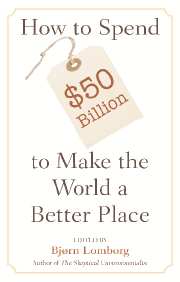Book contents
- Frontmatter
- Contents
- Contributors
- Introduction
- 1 Meeting the Challenge of Global Warming
- CLIMATE CHANGE – OPPONENTS' VIEWS
- 2 Communicable Diseases
- COMMUNICABLE DISEASES – OPPONENTS' VIEWS
- 3 The Challenge of Reducing the Global Incidence of Civil War
- THE CHALLENGE OF CONFLICTS – OPPONENTS' VIEWS
- 4 Toward a New Consensus for Addressing the Global Challenge of the Lack of Education
- THE CHALLENGE OF LACK OF EDUCATION – OPPONENTS' VIEWS
- 5 The Challenge of Poor Governance and Corruption
- THE CHALLENGE OF POOR GOVERNANCE AND CORRUPTION – OPPONENTS' VIEWS
- 6 Hunger and Malnutrition
- HUNGER AND MALNUTRITION – OPPONENTS' VIEWS
- 7 Population and Migration
- POPULATION: MIGRATION – OPPONENTS' VIEWS
- 8 The Water Challenge
- THE WATER CHALLENGE – OPPONENTS' VIEWS
- 9 Subsidies and Trade Barriers
- SUBSIDIES AND TRADE BARRIERS – OPPONENTS' VIEWS
- Expert Panel Ranking
- Index
THE WATER CHALLENGE – OPPONENTS' VIEWS
Published online by Cambridge University Press: 27 July 2009
- Frontmatter
- Contents
- Contributors
- Introduction
- 1 Meeting the Challenge of Global Warming
- CLIMATE CHANGE – OPPONENTS' VIEWS
- 2 Communicable Diseases
- COMMUNICABLE DISEASES – OPPONENTS' VIEWS
- 3 The Challenge of Reducing the Global Incidence of Civil War
- THE CHALLENGE OF CONFLICTS – OPPONENTS' VIEWS
- 4 Toward a New Consensus for Addressing the Global Challenge of the Lack of Education
- THE CHALLENGE OF LACK OF EDUCATION – OPPONENTS' VIEWS
- 5 The Challenge of Poor Governance and Corruption
- THE CHALLENGE OF POOR GOVERNANCE AND CORRUPTION – OPPONENTS' VIEWS
- 6 Hunger and Malnutrition
- HUNGER AND MALNUTRITION – OPPONENTS' VIEWS
- 7 Population and Migration
- POPULATION: MIGRATION – OPPONENTS' VIEWS
- 8 The Water Challenge
- THE WATER CHALLENGE – OPPONENTS' VIEWS
- 9 Subsidies and Trade Barriers
- SUBSIDIES AND TRADE BARRIERS – OPPONENTS' VIEWS
- Expert Panel Ranking
- Index
Summary
Frank Rijsberman's paper on the challenge of water and sanitation provision attracts considerable agreement from the authors of the two opponent papers. John Boland, in particular, is sympathetic to most of the analysis, although he has some doubts about the ease of implementation of the proposals. Henry Vaux, although accepting many of the arguments put forward, has one point of substantial disagreement: He believes that the water challenge is largely defined by scarcity, whereas Rijsberman takes the view that is primarily an issue of fair and effective access.
Vaux agrees with the challenge definition as provision of water and sanitation to the unserved. However, he considers the Millennium Development Goal as an unrealistic basis for quantitative analysis. To halve the numbers of unserved by 2015 implies, for example, bringing sanitation to 825,000 unserved people each day from now until 2015. In his words, this does not seem “physically, institutionally, or economically attainable.” By extension, the benefits of the proposals would be lower.
He emphasizes the critical point that interventions must be made in combination, and should link appropriate technology with effective institutions. The neglect of institutional problems has in the past led to the failure of many schemes. He also concurs with the point that water and sanitation are necessary but not sufficient for economic growth to occur.
- Type
- Chapter
- Information
- How to Spend $50 Billion to Make the World a Better Place , pp. 141 - 146Publisher: Cambridge University PressPrint publication year: 2006

